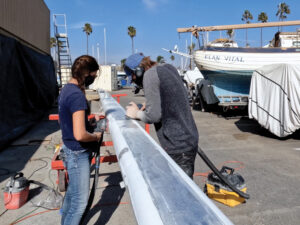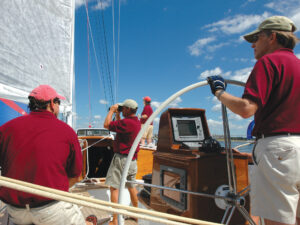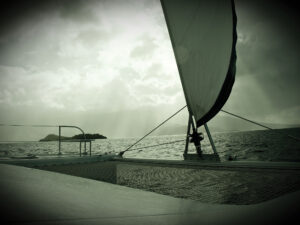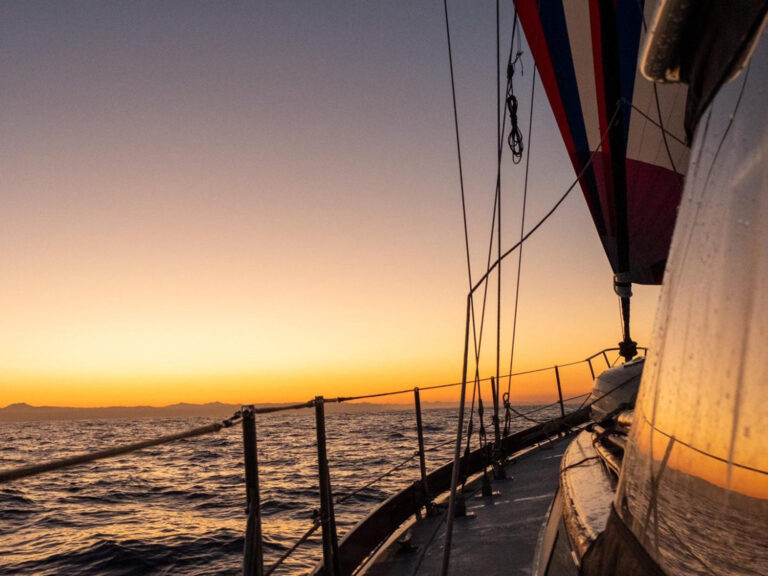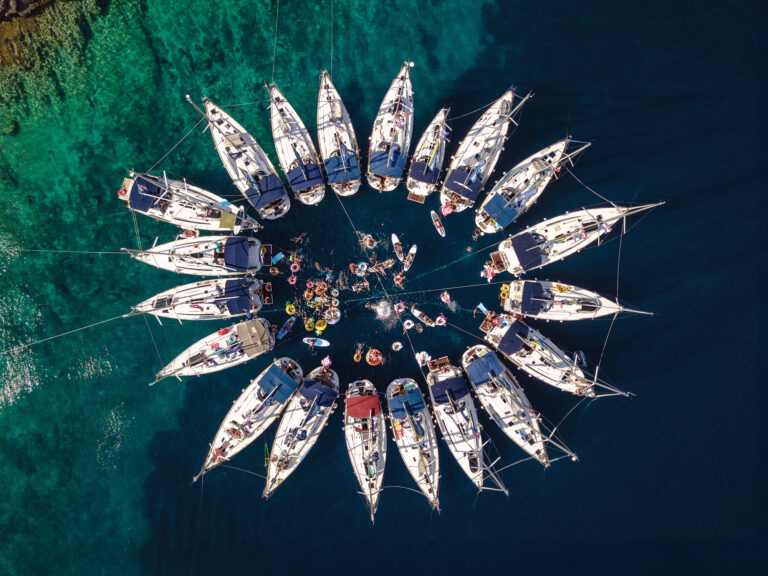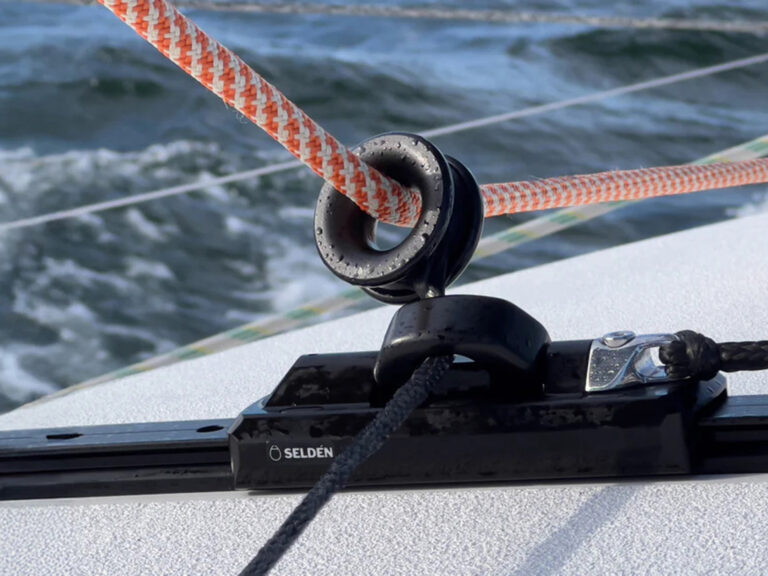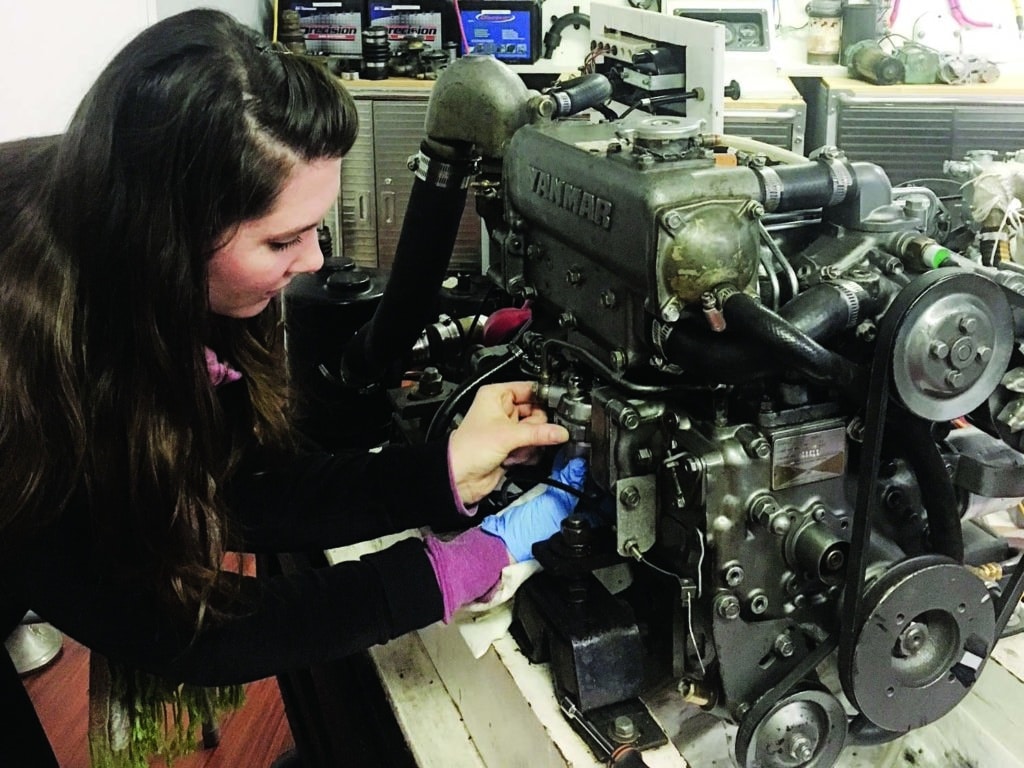
It started with a question. “Are you in this class?” the man on my right asked. “Yes,” I replied. “Marine diesel, right?” We were all awaiting the start of the diesel-engine class. And there I was, with a pink scarf draped around my neck, hair pulled back in a ponytail, and a bright blue purse slung over my shoulder. It was then that it hit me:* I’m the only woman here*.
But why would that stop me? My husband had taken the class a year before, and I wanted to know just as much as he did about our Yanmar 4JH3E. I wasn’t about to let a room full of testosterone prevent me from that. I wanted to become a better asset to our two-person sailing team. We had aspirations of traveling the world together aboard our Baba 40 sailboat, The Pioneer. I hoped that by taking this class I would be able to diagnose potential engine problems and provide ideas in solving them.
I’d scanned the room for an open seat just like a new kid in a middle school lunchroom. I could feel a lump in my throat. Just find a seat. I inhaled a shallow breath and saw a vacant spot between two men in the front row. I nervously excused myself as I wiggled my way down the row toward the empty seat. My classmates stared at me with eyes that said, What are you doing here?
“Hi, I’m Hannah” I smiled as I held out my hand. “Hello,” the bearded man replied, with a gruff shake. The three of us started up a brief conversation. I discovered one owned a trawler in New England, and the other planned to charter a sailboat in the Caribbean for vacation. When the instructor arrived, as he scrolled through his roster, he showed no sign of surprise that a girl was taking his class. A seasoned diesel mechanic and teacher, he proceeded to lead us through a series of PowerPoint slides, explaining the necessary balance among air, heat and fuel needed to propel a diesel.
As we covered the basics of fuel injectors, the hydraulic process, and the properties of diesel, my pen flew across the pages in my notebook in a mad dash to capture as much of the content as I could. I sketched little pictures to go along with my notes. Every now and then, the man next to me peeked over his glasses at what I was writing. Did he think my notes were girly? My insecurity swelled.
When the instructor discussed how the use of glow plugs heats an engine before ignition, I started wondering why we did not have glow plugs on ours. So, without much more thought, I jerked my hand into the air: “How does the engine get warm enough to start if there aren’t any glow plugs?”
Once the words had left my mouth, I could feel my cheeks burn a flushed crimson, and I realized all eyes were now upon me. Oh, no. Was that a stupid question? Did everyone already know this? Were they all annoyed I had asked?
Over the course of the class’s first hour, not one student had dared to ask a question. Since I’d been the first, I wondered if I was even supposed to ask questions at all. My heart was throbbing. To my relief, the instructor appeared unfazed by my question. He explained that larger diesel engines, such as our 54 hp Yanmar, did not need glow plugs because they relied on compression to heat them to a high enough temperature for fuel ignition on their own, with just the hot high-pressure air.
As I looked around and nervously awaited the start of my class, it suddenly dawned on me that I was the only woman there.
I went back to my note taking and hoped that if I had another question, other students would speak up and ask questions too so I wouldn’t look like an idiot. But no one did. The instructor even asked a few times at the end of a section if the class had questions; instead, the men looked around, out the window, or down at their complimentary copy of Nigel Calder’s Marine Diesel Engines: Maintenance, Troubleshooting, and Repair. And then we learned about the possible causes of different-colored engine smoke: black, white and even blue. I found myself wondering why burning oil made blue smoke, so I shot my hand up again.
After taking my question, I caught the instructor looking around the classroom. Several students looked up interested, and a few nodded their heads. Perhaps they had had the same question about blue smoke too? I felt less ashamed this time. Were they relieved that I was raising my hand with their questions so they wouldn’t have to?
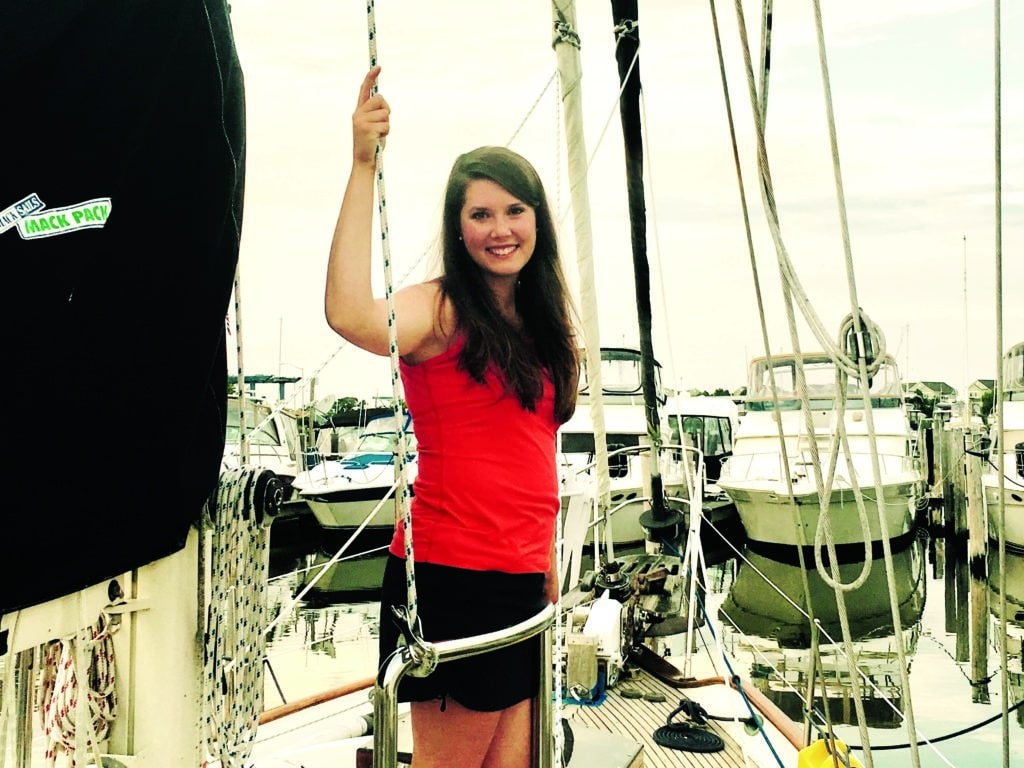
A man from behind me leaned forward and whispered: “Thanks. I actually had been wondering that too.”Oddly enough, the instructor appeared pleased that I had asked, and used it as a segue into the next segment on oil maintenance and changing oil filters. He walked us through a series of diagrams on how worn valves or aged guide seals in the cylinder head weaken, and oil seeps into them over time, causing the oil to burn. And the chemicals in oil often burn a bluish color. Made sense.
As I looked around the room, it dawned on me that the men wanted to appear manly to their fellow men. From the time they’d been boys in the high school locker room, their male ego was on the line. This class was no different. Masculine ego was dictating that they pretend to understand everything about superchargers, turbochargers and mixing elbows so the other men in the class would respect them too. Asking questions showed weakness. And they were desperate to look knowledgeable about manly things like engines. In reality, they’d learn a lot more if they’d let down their guard about what all the other men in the class thought of them and started asking their questions too.
But was that too much to ask? What would it take for just one of them to take the risk of asking a question and potentially open the floodgates for the other men in the class to ask their questions too?
And then it finally happened. We were covering the material about hydrostatic locks and what to do if an engine made a clunk, clunk, clunk sound instead of turning over to start. The man from behind me shot his hand up into the air. You could have heard a pin drop. I knew how he must have felt as all eyes were now on him. But I did not dare turn around. I did not want to add to his embarrassment, and I was cheering inside.
I don’t remember his exact question, but I do know the instructor’s answer was to check the raw-water pump first. He had a broad grin on his face, and his eyes seemed to be telling the rest of the men in the class that asking questions was the brave, manly thing to do.
It didn’t take long for another hand to go up asking about how often to change the coolant in the closed cooling system. Answer: every one to two years. Less than a half-hour later, a third man asked about his Westerbeke engine and whether he should be checking his zincs more frequently. The answer was yes, at least monthly.
By the end of the day, my questions had been joined by a chorus of at least five others. And the next day, the class model evolved into even more questions and discussion as more and more men felt comfortable enough to voice what they did not understand.
Whether my asking questions made a difference at the start of the day, I will never know. But as I sat there surrounded by the “diesel-engine shop talk,” I recognized something else that I took away from the class as invaluable.
I might not equate my self-worth with how much I know about raw-water pumps, hydraulic transmissions and heat exchangers, but I do recognize that the way to gain more confidence is by investing in yourself by asking questions, taking classes, and learning from others who are more knowledgeable than you. I might be uncomfortable or feel out of place at first, but that discomfort will propel me toward the more confident, knowledgeable person I hope to be, regardless of gender and societal stigmas.
It will make me a better sailor too, which is the reason I was there in the first place. That “extra” lesson was a bonus.
Hannah Knecht spent several years sailing and cruising aboard The Pioneer, a Baba 40. She is now the program director for Hands Across the Sea, a nonprofit organization founded and run by cruising sailors that promotes literacy in the Eastern Caribbean.

